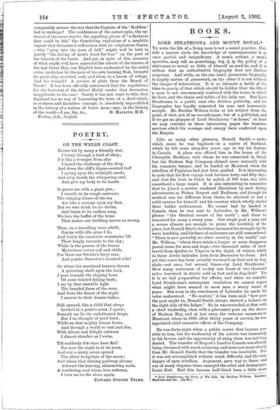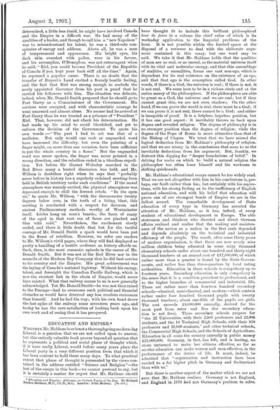BOOKS:
LORD STRATHCONA AND MOUNT ROYAL.* To write the life of a living man is not a sound practice. Out- side a narrow circle the knowledge of contemporaries is at once partial and insignificant. A man's actions, a man's speeches, .maytell. as _aomethipg; bat it js the. p.olicy of A statesman to reveal as little of himself as need be, and it is seldom that in -aitthofFitatiVe" biography does not disclose surprises. And while, on the one .hand, premature biography is largely matter a guesswork, on the other it is not without the danger of indiscretion. It is so intimate a habit of the time to gossip of that which should be hidden that the life of a man is not uncommonly confiised with the house in which he lives, and. the chairs and tables of his daily use. But Lord Strathcona is a public man who dislikes publicity, and his biographer has loyally respected his rare and honourable scruple. Mr. Beckles Willson looks at his subject from the point of view, not of an eavesdropper, but of a politician, and if we get no glimpse of Lord Strathcona "at home," at least we may consider in these interesting pages the immense services which his courage and energy have conferred upon the Empire.
Like so many other pioneers, Donald Smith — under which name he was baptised—is a native of Scotland, which he left some sixty-five years ago to try his fortune in Canada. A place was offered him in the house of the Cheeryble Brothers, with whom he was connected in blood, but the Hudson Bay Company chimed more naturally with his romantic temper, and he landed at Montreal when the rebellion of Papineau had just been quelled. It is interesting to note that his first voyage took between forty and fifty days, and that the boat in which he sailed, of 800 tons, was then considered a large vessel. It is also interesting to remember that he joined a service rendered illustrious by such daring adventurers as Prince Rupert and Radisson, and though his method was far different from theirs, he attained at last a solid success for himself and his country which wholly eluded their bolder recklessness. No sooner had he landed in Canada than he was sent to Labrador, in Mr. Wilson's phrase "the bleakest corner of the earth"; and there he remained for many a weary year. One single post a year and a severe climate are enough to prove the hardship of the place, but Donald Smith doubtless increased his strength by the mere hardship, and his feats of endurance are still remembered. "There is now probably no other country in the world," says Mr. Willson, "where there exists alenger or more dangerous postal route for men and dogs,--two thousand miles of land- travel from Quebec to Ungava in the depth of winter, which in these Arctic latitudes lasts from December to June. And yet this route has been actually traversed on foot and in dog- sleds—not once, but several times—by Lord Strathcona." How many statesmen of to-day can boast of two thousand miles traversed in Arctic cold on foot and in dog-sled P Yet it is no bad preparation for affairs, and when we consider Lord Strathcona's subsequent resolution we cannot regret what might have seemed to most men a weary waste of years. But even in the remoteness of Labrador be made his value understood. "No matter," it has been said, "how poor the post might be, Donald Smith always showed a balance on the right side of the ledger." So he was rewarded, at first with a chief tradership, then with a pleasanter post on the shores of Hudson Bay, and at last came the welcome summons to Montreal, where in 1868, after thirty years of service, he was appointed chief executive officer of the Company.
He was forty-eight when a public career first became pos- sible to him, but the husbandry of his talents was immensely in his favour, and the opportunity of using them was not long denied. The transfer of Rupert's Land to Canada was already being discussed with much acrimony, and none saw more clearly than Mr. Donald Smith that the transfer was inevitable. But it was not accomplished without much difficulty and the near danger of open rebellion. Argument gave way to force, and out of many disputes there emerged the rebel and demagogue, Louis Riel. Had this famous half-blood been a little more
• Lord Strathoona: the Story of His Lid's. By Beckles Willson. London: Methuen and Co. Ps. dd.} determined, a little less timid, he might have involved Canada and the Empire in a difficult war. He had many of the qualities of a leader, and though to call him a "new Napoleon" was to misunderstand his talent, he was a third-rate con- spirator of energy and address. Above all, he was a man of temperament and appearance. His bright eyes, his dark skin overshot with pallor, were in his favour, and his accomplice, O'Donoghue, was not extravagant when he said, "Riel, you could become President of the Republic of Canada if you kept your back stiff all the time." Again, he espoused a popular cause. There is no doubt that the transfer of Rupert's Land excited a fiercely hostile feeling, and the fact that Riel was strong enough to exclude the newly appointed Governor from his post is proof that he carried his followers with him. The situation was delicate, indeed, when Mr. Donald Smith proposed that he should go to Fort Garry as a Commissioner of the Government. His services were accepted, and with characteristic courage he went unarmed and almost alone. No sooner had he arrived at Fort Garry than he was treated as a prisoner of "President" Riel. That, however, did not check his determination. He had made up his mind to avoid bloodshed, and yet to enforce the decision of the Government. To quote his own words :—" The part I had to act was that of a mediator. Not only would one rash or unguarded word have increased the difficulty, but even the pointing of a finger might, on more than one occasion, have been sufficient to put the whole country in a flame." But the unguarded word was never spoken, the finger was never pointed in a wrong direction, and the rebellion ended in a bloodless expedi- tion. Yet before Sir Garnet Wolseley marched to the Red River many a heated discussion was held, and Mr. Wilson is doubtless right when he says that "probably never before in history has a regularly ordained meeting been held in British territory under such conditions." If the moral atmosphere was warmly excited, the physical atmosphere was depressed enough to chill the fiercest rebels. "In the open air," to quote Mr. Willson, "with the thermometer twenty degrees below zero, in the teeth of a biting blast, this meeting is conducted with a respect for decorum and ancient Parliamentary methods worthy of Westminster itself. Icicles hang on men's beards ; the faces of many of the aged in that vast sea of faces are pinched and blue with cold." Nevertheless, the excitement slowly cooled, and there is little doubt that but for the tactful courage of Mr. Donald Smith a spark would have been put to the flame of rebellion. However, we refer our readers to Mr. Willson's vivid pages, where they will find displayed as pretty a handling of a hostile audience as history affords us. Such, then, is the most romantic episode in the career of Mr. Donald Smith. But it was not at the Red River nor in the councils of the Hudson Bay Company that he did best service to his country and the Empire. His great achievement was the laying of Canada's national highway. Without his energy, talent, and foresight the Canadian Pacific Railway, which is now the stoutest link in the chain of Empire, would never have existed. What that railway means to us is now generally acknowledged. Yet Mr. Donald Smith—he was not then raised to the Peerage—had to overcome such political and financial obstacles as would have deterred any less resolute statesman than himself. And he had his way; with his own hand drove the last spike of the railway some seventeen years ago, and to-day he has the rare satisfaction of looking back upon his own work and of seeing that it has prospered.







































 Previous page
Previous page